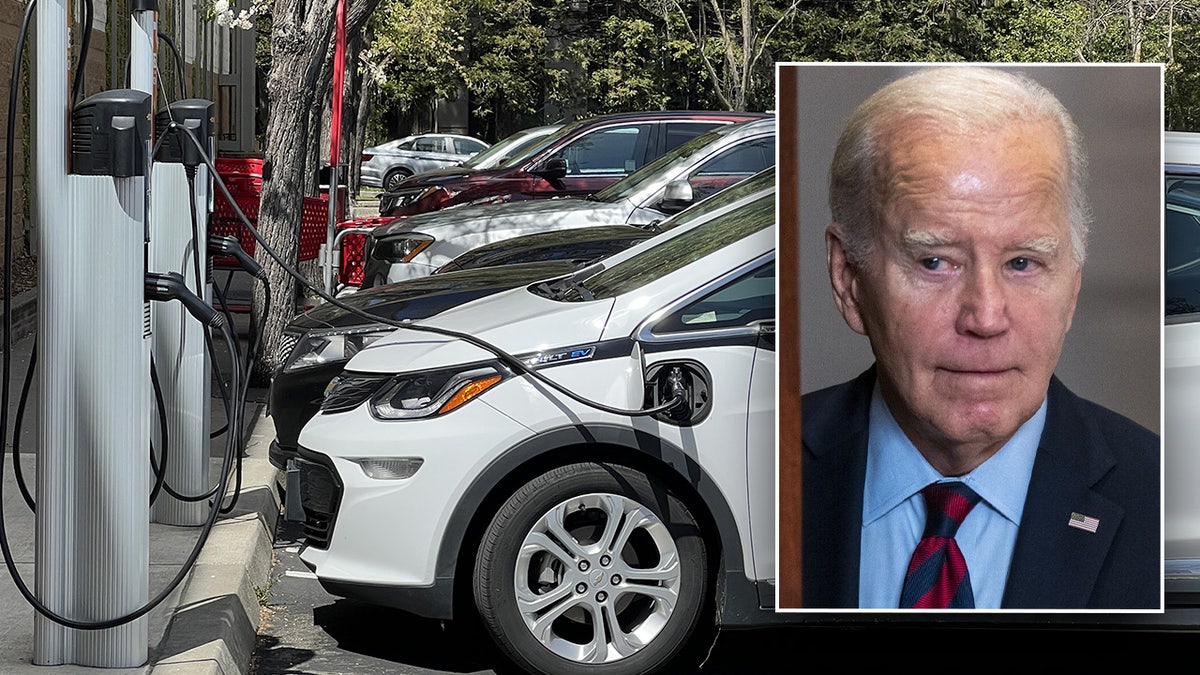Electric vehicle demand falls short of manufacturers’ expectations
FOX News' Bret Baier reports on the demand for electric vehicles and why some companies are readjusting their targets and slowing down production on 'Special Report.'
FIRST ON FOX: The House is expected to hold a floor vote this week on legislation that would strike down pending federal regulations targeting gas-powered vehicles and prohibit any future electric vehicle (EV) mandate.
The Choice in Automobile Retail Sales (CARS) Act – introduced over the summer by Reps. Tim Walberg, R-Mich., and Andrew Clyde, R-Ga. – will be considered by the House Rules Committee on Monday before officially receiving a floor vote as soon as Tuesday. If the bill is passed, it would then be voted on by the Senate, where Republicans and Democratic Sen. Joe Manchin recently introduced companion legislation.
"The House must pass the Choice in Automobile Retail Sales Act to block a radical and unattainable federal EV mandate that will cripple our auto industry and forever make our supply chain reliant on China," Walberg told Fox News Digital on Monday. "The American auto industry is at its best when they are free to innovate and listen to the will of consumers, and not constrained by bureaucracy."
"If this mandate goes into effect, many American families will be priced out of the market, and we will cede leadership of this industry to China," he continued. "Instead, we must prioritize affordability, innovation and freedom for each family to decide what car is best for them."
MARCO RUBIO LEADS EFFORT TO BLOCK CLEAN ENERGY CREDITS FROM AUTOMAKERS THAT OFFSHORE JOBS

Reps. Tim Walberg, left, and Andrew Clyde introduced the CARS Act in July. (Bill Clark/CQ Roll Call via Getty Images | Anna Moneymaker/Getty Images)
Walberg and Clyde, along with more than a dozen other House Republicans, introduced the legislation months after the EPA proposed its most aggressive tailpipe emissions ever. If the rule is finalized, a staggering 67% of new sedan, crossover, SUV and light truck; up to 50% of bus and garbage truck; 35% of short-haul freight tractor; and 25% of long-haul freight tractor purchases could be electric by 2032, the White House projected.
If the CARS Act is implemented, it would block the EPA regulations, which are part of the Biden administration's broader effort to expand EV adoption in the U.S. and fight global warming by curbing carbon emissions.
FORD DRAMATICALLY SCALES BACK EV PLANT AMID PLUMMETING SALES IN BLOW TO BIDEN'S GREEN ENERGY GOALS
In addition to blocking the proposed tailpipe emissions regulations, the CARS Act would prohibit regulations mandating the use of any specific technology or regulations that limit the availability of new vehicles based on engine type. The legislation would additionally require the EPA to update any regulations that limit new vehicles based on engine type within two years.
"Aggressive, EV-only mandates take away consumer choice, stifle investment in alternate emission reduction opportunities, and benefit foreign adversaries like China with substantially more emission-intensive manufacturing than the United States," Heather Reams, the president of Citizens for Responsible Energy Solutions, a right-leaning environmental nonprofit, told Fox News Digital.
"CRES is proud to support Rep. Walberg’s CARS Act because it prohibits the Biden administration from imposing aggressive and unrealistic emissions standards on American consumers, so we can apply an all-of-the-above approach to the transportation sector and reward emission abatement instead of EV purchases," Reams said.

President Biden has set a goal of ensuring 50% of car purchases are electric by 2030. (Getty Images)
Since the Biden administration proposed the tailpipe emissions rules, which would impact car model years 2027 through 2032, Republicans and energy experts have blasted the actions. They have argued EVs are costly, less efficient and more dependent on Chinese supply chains than traditional gas-powered cars.
According to Cox Automotive data, factoring in generous tax credits, the average transaction price for electric cars was $53,469 as of July 2023 while the average price of gas-powered vehicles was $48,334. And the Department of Energy reported that the average range of model year 2021 gasoline vehicles was 403 miles compared to the median 234-mile range of model year 2021 EVs.
CLICK HERE TO GET THE FOX NEWS APP
The EPA's tailpipe regulations are coupled with a series of other actions pursued by the Biden administration targeting gas-powered cars. The Department of Transportation's National Highway Traffic Safety Administration proposed aggressive fuel economy regulations earlier this year that automakers have warned would lead to billions of dollars in penalties, costs that would be passed on to consumers.
The CARS Act has been endorsed by energy industry groups, including the American Petroleum Institute and American Fuel & Petrochemical Manufacturers.





